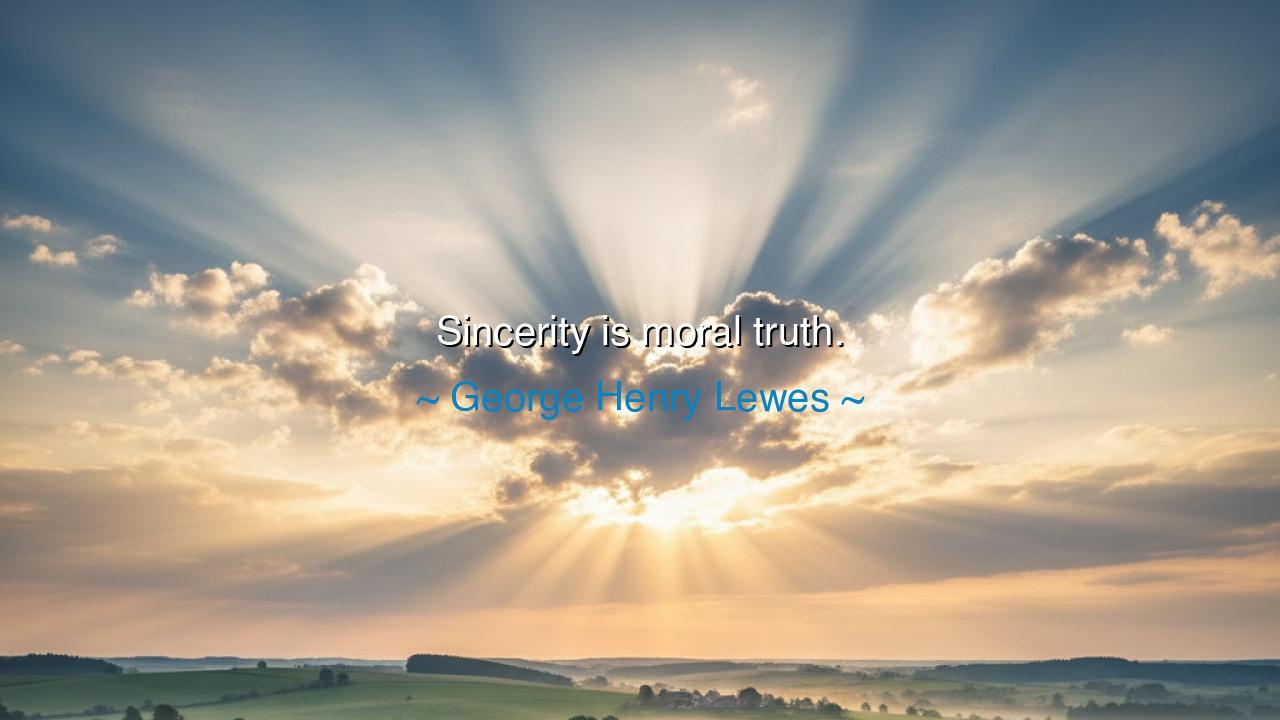
Sincerity is moral truth.






George Henry Lewes, philosopher, critic, and seeker of human understanding, once declared with crystalline clarity: “Sincerity is moral truth.” In these words, brief yet immense, lies a wisdom that cuts to the very marrow of ethics. For Lewes saw that beyond all systems of law, beyond dogma and doctrine, beyond the complex machinery of morality built by men, the foundation is this: to be sincere, to speak and act without deception, is already to live in truth.
The origin of this insight springs from Lewes’ own life, woven as it was with intellectual struggle and personal trial. He was a man of letters who lived unconventionally, bound not by society’s rigid codes but by the compass of honesty within. Partner to the great novelist George Eliot, he lived in a relationship scorned by many in Victorian society, yet endured because it was founded on sincerity of heart. To him, truth was not merely what could be proven by logic or science, but also what flowed from the unfeigned soul. Thus he proclaimed that sincerity is the highest form of moral truth, for it is the inner reality shining outward, uncorrupted by lies or masks.
History itself proves the power of this teaching. Think of Abraham Lincoln, who in the midst of a nation torn by civil war, guided his people not by lofty pretensions but by an unshakable sincerity. His words, simple and plain, carried the weight of moral truth because they reflected the honesty of his heart. He did not cloak the cost of war in false glory; he spoke openly of suffering and sacrifice. It was this sincerity that made his leadership enduring, that allowed his words—like the Gettysburg Address—to live beyond the moment, resonating as moral truth for generations.
The meaning of Lewes’ quote also shines in the contrast it implies. For what is hypocrisy but the death of moral truth? A man may speak noble words, but if his heart is false, then his morality is but an illusion. Religion without sincerity is superstition. Justice without sincerity is tyranny. Love without sincerity is manipulation. But when sincerity dwells within action, even the humblest deed carries the grandeur of truth. To speak honestly, to live transparently, is to align the outer life with the inner soul—this is the essence of morality.
Yet sincerity is not without cost. To live sincerely is to stand vulnerable before the world, stripped of masks, refusing the armor of deceit. It is to speak truth when silence would be easier, to admit weakness when pride demands a lie, to reveal the heart when fear would conceal it. And yet, only through such vulnerability can a person live with dignity. For the man who deceives others deceives himself first, and the woman who hides behind falsehood imprisons her own spirit. Sincerity is freedom, and in freedom lies moral truth.
The lesson for us is simple yet demanding: live sincerely, and you live rightly. Do not cloak your intentions with false words; let your speech and action spring from the same source. Do not pretend to virtues you do not possess; instead, cultivate them openly and humbly. Do not seek approval through masks, for masks rot and fall away, leaving only shame. To live sincerely is to build a life that does not crumble under scrutiny, a life whose strength is its honesty.
Practically, this means pausing before you speak, and asking: “Do my words reflect my true heart?” It means examining your actions and asking: “Do they reveal my authentic self, or are they a performance for others?” Write your thoughts truthfully, speak plainly, admit your errors without excuse, and confess your joys without pretense. By such small daily acts, sincerity grows, and with it, moral truth shines forth.
Thus Lewes’ words endure like a carved pillar: “Sincerity is moral truth.” Carry them with you, and pass them down. For in a world clouded with deceit, sincerity is light. In an age of false appearances, sincerity is strength. And in the life of every human being, sincerity is the path by which the soul aligns with the eternal truth that cannot be corrupted, only lived.






Cchohuy
Sincerity seems like an ideal we should all strive for, but is it always a reflection of moral truth? What if someone is sincerely wrong or believes something untrue? Can sincerity still be morally good if the truth itself is flawed? This also makes me wonder about the times when people’s sincerity doesn’t align with broader societal values—does that mean their sincerity isn’t morally true, or does it depend on perspective?
TMTra My
I’ve always thought of sincerity as a personal value, but this idea suggests it has a broader, moral weight. Does this mean we have a moral obligation to be sincere? If so, does that apply even when sincerity might cause harm, like in cases where the truth is harsh? How do we reconcile sincerity with compassion in such situations? Can moral truth ever be too blunt to be helpful?
TTTran Ngoc Thanh Tam
This quote raises an interesting question: if sincerity is moral truth, does that mean being insincere is a form of moral corruption? But what about situations where telling the truth might harm someone’s feelings or well-being? Does sincerity always align with what’s morally right? I wonder how much context matters in determining whether sincerity is truly moral, or if it's an absolute truth in all situations.
DTLe Thi Diem Thuy
I find it interesting that sincerity is equated with moral truth. Does that mean if we’re not sincere, we’re not being truthful in a moral sense? Could it be that honesty, in its raw form, is only truly moral when it's sincere? How does one balance being truthful without sincerity? Is sincerity the foundation that allows truth to be moral, or can truth stand on its own without it?